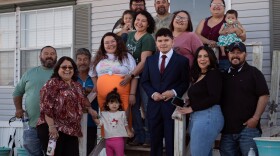The U.S. Supreme Court has agreed to hear two cases challenging state attempts to penalize Electoral College delegates who fail to vote for the presidential candidate they were pledged to support.
Electoral College delegates are selected by each party, and under state laws, they are pledged to cast their ballots for the candidate who carries the popular vote. But from 1796 to 2016, over 20 presidential elections, 150 electors have not abided by that pledge, according to FairVote, a nonpartisan voting rights advocacy group.
In fact, 2016 marked the largest number of faithless voters — a total of seven who cast votes for candidates they were not pledged to support.
States have tried to prevent such "faithless elector" votes by enacting laws to remove them or fine them or both.
Now, just as the presidential campaign is heating up, the Supreme Court has agreed to hear challenges to such state laws in Washington and Colorado.
"This court should resolve this conflict now, before it arises within the context of a contested election," Lawrence Lessig, a Harvard law professor who is the attorney for the Washington state electors, said. "As the demographics of the United States indicate that contests will become even closer, there is a significant probability that such swings could force this court to resolve the question of electoral freedom within the context of an ongoing contest."
However the high court rules, the cases are likely to focus national attention on the shortcomings and uncertainties of the Electoral College in an era when two presidential candidates have lost the popular vote but won the presidential election in the Electoral College.
Copyright 2021 NPR. To see more, visit https://www.npr.org.






